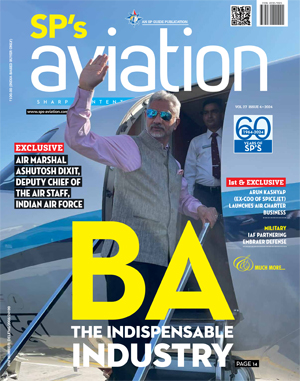INDIAN ARMED FORCES CHIEFS ON
OUR RELENTLESS AND FOCUSED PUBLISHING EFFORTS

SP Guide Publications puts forth a well compiled articulation of issues, pursuits and accomplishments of the Indian Army, over the years

I am confident that SP Guide Publications would continue to inform, inspire and influence.

My compliments to SP Guide Publications for informative and credible reportage on contemporary aerospace issues over the past six decades.
India Finally Stands Up To Russian Blackmail Issues Global Tenders For Spares

Pushed to the brink by the unreliability of Russian after-sales support, India, for the first time, has hit the international market for spares for Russian-made aircraft and missile systems operated by the Indian Air Force (IAF). Traditionally, these vital spares are sourced from original equipment manufacturers through the Rosboronexport interface.
The UPA Government has given the go-ahead to the IAF to approach vendors in Europe, US and Israel to urgently replenish its stocks of spares for Russian-made equipment. At last count, 47 global tenders have been floated to source equipment ranging from spares for the MiG-29 engines (R-29) to tubeless tyres for the Sukhoi-30 MKI and parts for the Pechora and OSA-AK surface-to-air missile (SAM) systems, and ground-based radars.
More tenders are on the way. The urgent spares calls extends to the An-32 transport fleet, for which additional tenders have been floated. Global tendering for spares is being done under the Defence Procurement Procedure (DPP).
Sources in the IAF concede that serviceability rates of Russian-made platforms are “unacceptably low” due to poor availability of spares and aftersales support. “This is hurting India’s battle readiness,” rues a senior Air Force officer. The concern extends to even the frontline Su-30 MKI fleet, a showpiece of Indo-Russian defence cooperation.
The position with regard to the availability and serviceability of IL-76 heavy lifters and the IL-78 tankers is “worrying,” says the officer. “This goes beyond a quarrel over cost,” he points out gravely. The MiG-29 serviceability, too, is a problem.
The trigger, sources reveal, are fresh Russian demands for price hike and new contracts. While the problem is not new, the move to approach the international market is India’s signal that it won’t always submit to armtwisting and blackmail. The price esclation in the Admiral Gorshkov deal, and the renegotiation of a settled contract to increase the price of refit from $974 million ( Rs. 4,261 crore) to $2.33 billion ( Rs. 10,485 crore)— with no penalty for a five-year-delay— stands out in the public consciousness as a seminal pointer to the unreliability of India’s traditional arms supplier.
The move to bypass Russians for a reliable, uninterrupted supply of spares follows the failure of repeated assurances provided to India at the Indo-Russian Inter-Governmental Commission for Military-Technical Cooperation, the highest body governing defence trade between New Delhi and Moscow.
Russia has a history of punishing arms buyers who seek to bypass it for spares and upgrades, and there are concerns in India about possible retribution. India’s decision to stand up to Russia comes in the middle of key upgrade programmes. An over $2 billion ( Rs. 9,000 crore) contract has been signed for the upgrade of 50 Su-30 MKIs. A $1 billion ( Rs. 4,500 crore) programme is under way for the upgrade of 62 MiG-29s, with an additional $250 million ( Rs. 1,125 crore) earmarked for engines. A $290 million ( Rs. 1,305 crore) contract has been signed for the upgrade of 160 Mi-17s while that for 28 Ka-28 naval helicopters is pegged at $189 million ( Rs. 851 crore).
Sources close to the Russian arms industry point out that procuring spares for their equipment from external sources and third parties—and working out economies of scale—may not be easy. They warn that that such moves may boomerang on India, suggesting, in stead, that “talking to sort out problems is the better option”. But with its new access to western suppliers and Israel, India is no longer willing to be taken for granted. It is demanding that its traditional arms supplier better shape up.
Note: The writer welcomes feedback from those who feel this step is not fair to Russia.
email: vishal.thapar@spguidepublications.com





